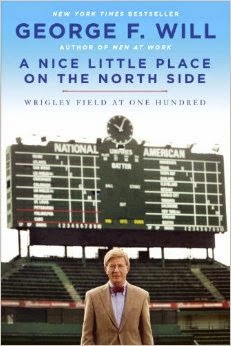I love Wrigley Field and was interested to see what George Will had to say about it. I went to a game this year and Wrigley was really spruced up for its 100th anniversary - I doubt it has ever looked better.
There's a lot of baseball lore in this book, much of which I'd heard before but enjoyed reading about again all the same. Will really meanders all over the place; this book is a musing on baseball more than anything else.
"There are no waves in central Illinois. There the land is flat, so some people consider the vistas dull. But, then, there are those who consider baseball dull, and as sportscaster Red Barber once said, baseball is dull only to dull minds." (p. 16)
I learned something about Johnny Evers and Joe Tinker - they detested each other, but were destined to go down in history as having played magically well together because "their proficiency at turning double plays became the subject of a famous and god-awful poem, 'Baseball's Sad Lexicon.'" (p. 38) I've certainly heard "Tinkers to Evers to Chance" often enough.
Will's basic thesis is that Wrigley Field is the cause behind the Cubs, against all odds, not having won the World Series in more than 100 years. He makes a lot of sound arguments. I was there in August 2014, on a Friday afternoon with the Cubs in last place, and there were still over 30,000 fans in attendance. I don't know how the Cubs can turn their losing streak around while still playing in Wrigley - neither does Will - but I hope they keep playing in Wrigley Field as long as I'm attending baseball games.
I doubt this book would have much appeal for someone who is not a fan of Wrigley Field, but I enjoyed it. Not a great book, but short and very readable. It can be found in the new nonfiction section of the Galesburg Public Library at 796.357 WIL.
Note for Galesburg residents: Mr. Carl Sandburg makes an appearance in this book. "Since his death in 1967, at age eighty-nine, his reputation has fallen on hard times, and has fallen from quite a height. In the 1950s and 1960s, he was what now seems like an oxymoron, a celebrity poet." (p. 21) I'm constantly amazed by how often Sandburg crops up in books I read.


No comments:
Post a Comment